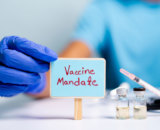The Senate Committee on Commerce, Science and Transportation, led by Chairman Roger Wicker (R-MS) and Ranking Member Maria Cantwell (D-WA), held a hearing June examining the effects of COVID-19 on the state of transportation and critical infrastructure. The hearing sought to examine the main challenges the transportation industry is facing as a result of the pandemic, and discuss what the congressional response should be.
During their opening remarks, witnesses outlined the losses their respective industries are facing during the pandemic. Among the witnesses was Randy Guillot, Chairman of the Board of the American Trucking Associations, who testified that Congress should invest in infrastructure, provide incentives to trucking companies to invest in cleaner and safer trucking equipment, and provide “reasonable protections” against excessive litigation.
Ian Jefferies, President and Chief Executive Officer of the Association of American Railroads, argued that temporary waivers from existing maximum truck weight limits for the delivery of emergency supplies should not be made permanent, while Larry Willis, President, Transportation Trades Department, American Federation of Labor and Congress of Industrial Organizations (AFL-CIO), expressed for S. 3728, the Critical Infrastructure Employee Protection Act.
A central topic of discussion was the bipartisan call for an infrastructure package. Witnesses unanimously affirmed their support for a comprehensive infrastructure package, and both the Chairman and the Ranking Member signaled their support for infrastructure funding as well. Chairman Wicker said “an infrastructure bill would not only invest money into our economy, but leave us with a lot to show for it.”
Sen. Rick Scott (R-FL) similarly argued that investment in infrastructure is “critical” to protecting the wellbeing of truck drivers.
One of the main issues highlighted by Republican Senators was liability protection. Several witnesses expressed that the liability protection the industry is seeking is narrow and “would not protect rogue bad actors, but the industry as all whole.” They highlighted the “robust” safety practices the industry has already put in place.
Sen. Tom Udall (D-NM) asked the witnesses what “specific and binding consumer protection standards” they would consider to be appropriate if Congress provided some liability protection.
Another issue of importance to Republican senators, in particular Sen. John Thune (R-SD), was the shortage of drivers the trucking industry is facing. Guillot expressed his appreciation for the hours-of-service waiver and the work DOT and FMCSA have been doing, but argued there needs to be more changes to the driver training and testing process because of the pandemic, especially in regards to obtaining commercial driving licenses.
A common concern from Democrats during the hearing was that the Trump Administration has not released mandatory workplace safety standards. Sen. Tammy Baldwin (D-WI) highlighted her bill that would require OSHA to issue such standards. Ranking Member Cantwell called it a “mistake” that the Department of Transportation (DOT) has not issued mandatory safety guidance as well. Agreeing with his colleagues, Sen. Richard Blumenthal (D-CT) called federal safety mandates for the transportation industry “absolutely necessary.”
Senators from both sides expressed frustration that the industry has not been equipped with adequate personal protective equipment (PPE). Sen. Udall argued that essential transportation workers should use N-95 masks, but acknowledged that supply is limited. Sen. Jackie Rosen (D-NV) agreed, and said there needs to be a “national coordinated strategy” to supply PPE to the industry. The Chairman also highlighted autonomous vehicles as a potential vessel for contactless delivery of critical supplies.
Other issues brought up in the hearing included modernization of the railroad retirement IT system, strategic investment in the supply chain, a decline in ridership on public transportation like buses and subways, availability of COVID-19 testing, and LNG pipelines. Chairman Wicker also mentioned that he and Ranking Member Cantwell will be sending letters to transportation groups not represented at the hearing to solicit their feedback.
NATSO submitted a statement for the record on June 4 that can be read here.
Subscribe to Updates
NATSO provides a breadth of information created to strengthen travel plazas’ ability to meet the needs of the travelling public in an age of disruption. This includes knowledge filled blog posts, articles and publications. If you would like to receive a digest of blog post and articles directly in your inbox, please provide your name, email and the frequency of the updates you want to receive the email digest.
